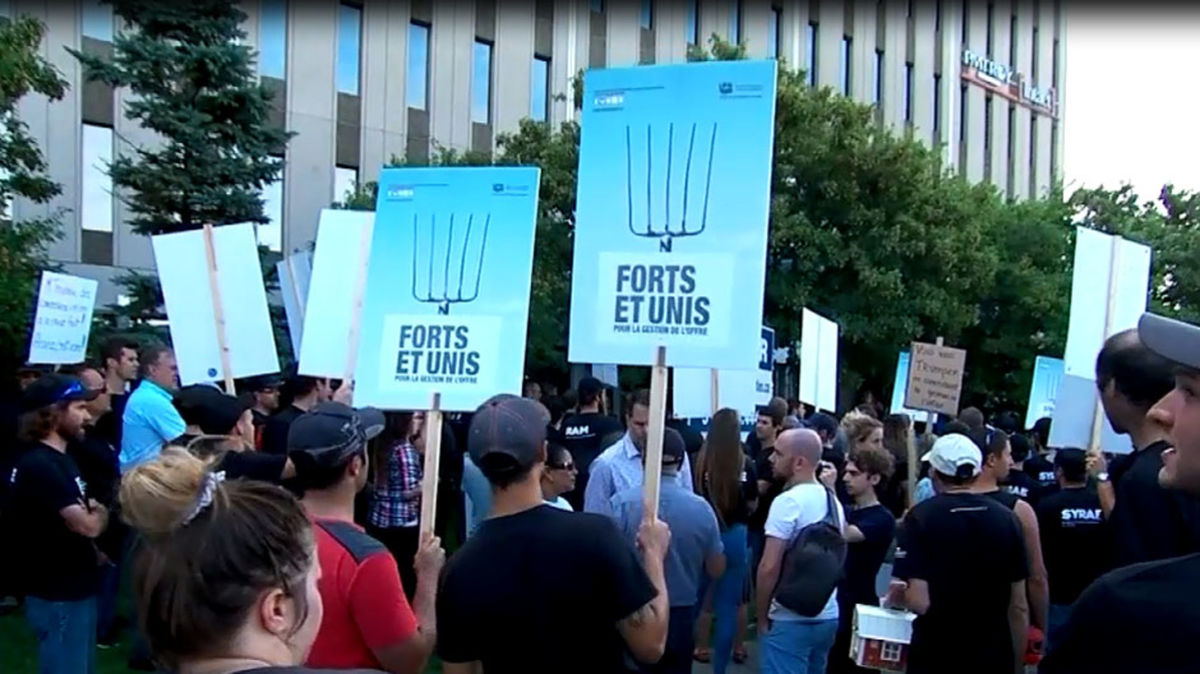Dairy farmers protest as NAFTA talks continue
Toutes les versions de cet article : [English] [français]
iPolitics | 6 September 2018
Dairy farmers protest as NAFTA talks continue
By Boris Proulx and Kelsey Johnson
MONTREAL — Some 300 farmers from across Canada took to the streets of Montreal Thursday morning to demand the Trudeau government make good on its promise to defend supply management, a protest that comes as NAFTA trade talks continue more than 900 km away.
“We want absolutely no concession,” Julie Bissonnette told iPolitics in French. “It’s our future that is in the hands of the minister.” Bissonnette is president of the fédération de la relève agricole du Québec and one of the organizers of Thursday’s rally.
Canada’s dairy industry has once again found itself in American crosshairs as U.S. negotiators continue to push for more dairy access as American producers continue to grapple with an over-saturated domestic market.
Canadian dairy farmers gather for a rally in Montreal Thursday, Sept. 6, 2018 in support of supply management as NAFTA talks continue PHOTO/Boris Proulx
Dairy farmer Greg Debbink, who farms near Leduc, Alta, said he needs the federal government to continue to support supply management so that he can one day take over his family’s farm, where they milk 160 cows.
“It’s a third generation farm and there’s no way I can do it the way that the Americans are doing it right now,” he explained as fellow protestors chanted “no concessions, no concessions,” behind him.
American negotiators demanded during the fourth round of NAFTA talks in Washington last October that Canada eliminate supply management within a decade and alter its domestic milk pricing classes. Supply management is a quota-based farming system that regulates the production and price paid to farmers for their dairy, eggs, chicken, turkey and hatching eggs.
Canadian officials have characterized that demand as a ‘non-starter.’ Prime Minister Justin Trudeau has repeatedly promised to defend Canada’s supply management system at the negotiating table.
Marie-Claude Bibeau, Canada’s minister of international development and the MP for Compton—Stanstead, a riding that’s home to many dairy farmers, was at Thursday’s rally in Montreal where she insisted the sector will be protected.
“We understand that it’s much more than the economy, it’s also the vitality of our region,” she said. “We are strongly committed to defend supply management.”
Farmers at the protest said they hope the prime minister sticks to his word.
“We’re looking for Trudeau’s support. He has supported us and we look for his continuous support,” Debbink said.
Alexandre Berlier, a 22-year-old dairy farmer, drove more than seven hours to attend the day’s rally. Agriculture, he said, is the backbone of rural communities. He milks 100 cows on his family’s farm near the small community of Normandin, in Quebec’s Saguenay-Lac-Saint-Jean region.
“The little communities – we remove agriculture – and they will no longer exist,” he said, adding there’s little economic future for young people in his community if they can’t farm.
Young farmers gather in Montreal to show their support for Canada’s suppy management system on Thursday, Sept. 6. 2018 PHOTO/Boris Proulx
All three farmers insisted no more concessions on the dairy front can be made.
“Enough is enough. No more concessions,” Debbink said, referring to recently agreed to trade deals.
Under the Comprehensive and Economic Free Trade Agreement (CETA), Canadian negotiators – who were lead by Steve Verheul, Canada’s current NAFTA lead – agreed to give European exporters access to nearly the nearly 18,000 tonnes of new cheese quota.
Meanwhile, under the yet-to-be ratified Comprehensive and Progressive Trans Pacific Partnership (CPTPP) agreement, Canada agreed to give its fellow CPTPP members new market access in all five supply managed sectors :
“A little concession can still do harm. We really don’t want them to do that,” Bissonnette said, adding dairy farmers have already given up some 15 per cent of the Canadian market place via other trade agreements.
The Trudeau government has promised to compensate the sectors affected by those concessions. Details about the compensation package have not been made public. The negotiating tussle over dairy at the NAFTA table also comes in the midst of a provincial election in Quebec, where the leaders of all four provincial parties have vowed to defend supply management.






